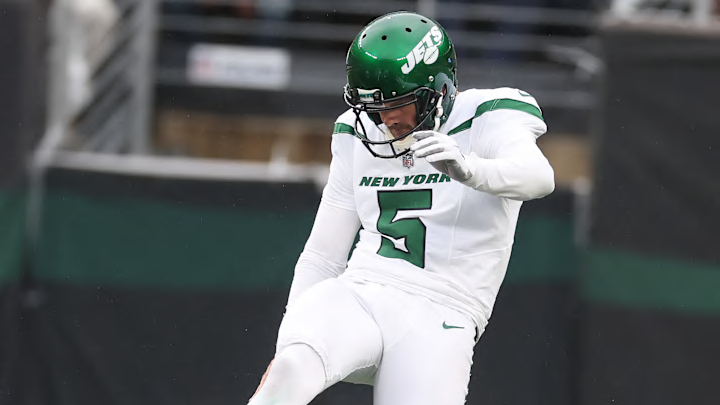The NY Jets are hoping to re-sign standout punter Thomas Morstead this offseason, but as we sit here just a few days away from the start of free agency, the team has not yet reached an agreement. In fact, they haven't re-signed any of their pending free agents at the time of writing.
In some cases, both team and player might be waiting to see how the market shakes out, but that isn't the case with Morstead. The Jets want to sign Morstead, but a little quirk in the NFL rulebook is preventing them from doing so.
ESPN's Rich Cimini reported on Friday that Morstead actually played the 2023 season under a Veteran Salary Benefit contract. Such a contract prevents Morstead from signing a new contract until the official start of the new league year next week.
This means that, even if the Jets wanted to, they would be unable to re-sign Morstead until next Wednesday at the earliest. Morstead might still be back, but he technically has to test free agency first.
RELATED: Thomas Morstead's unlikely football journey from high school soccer star to NY Jets punter
What is the NFL's Veteran Salary Benefit and why haven't the NY Jets re-signed Thomas Morstead?
The Veteran Salary Benefit is an unusual exception in the NFL's financial rulebook that allows a team to sign a veteran player to a minimum contract (with applicable service time) but only have to count said player at the salary level of a player with two years of service time against the cap.
There is no one uniform minimum salary in the NFL. The minimum salary for an NFL player increases based on the number of seasons a player has accrued.
For example, the minimum salary for a player with one year of experience in 2023 was $870,000 as compared to the minimum salary of a player with 7+ years of experience, which was $1,165,000. That's not an insignificant difference.
This salary cap exception allows teams to lower the cap hits of veteran players on minimum contracts. To be eligible for this type of contract, a player must have four or more accrued seasons, and the contract must be for no longer than one year.
Teams are also allowed to give out signing bonuses to increase compensation, but there is a cap on how high the bonus can be. I don't believe Morstead was given a signing bonus last season.
In Morstead's case, while his contract was officially worth the veteran minimum for a player with 7+ accrued seasons, $1,165,000, he only counted $940,000 against the salary cap. That saved the Jets $225,000 in 2023 cap space.
Morstead is eligible to sign another Veteran Salary Benefit contract in 2024, although it's unclear if he will be asking for more than the minimum salary this offseason. There is no limit on consecutive Veteran Salary Benefit contracts a player can sign, but they can only be for one year.
So, what does all of this mean? The safe money is still on the Jets re-signing Thomas Morstead this offseason, but for anyone hoping to see an extension reached before the start of free agency, just know this rule prevents that from happening.
